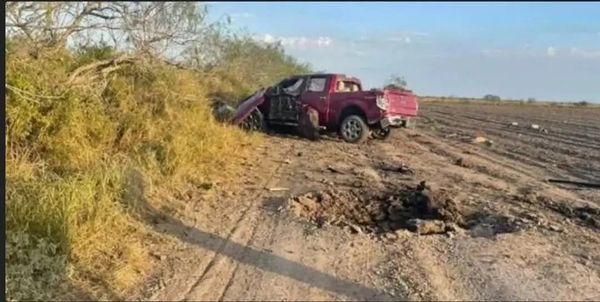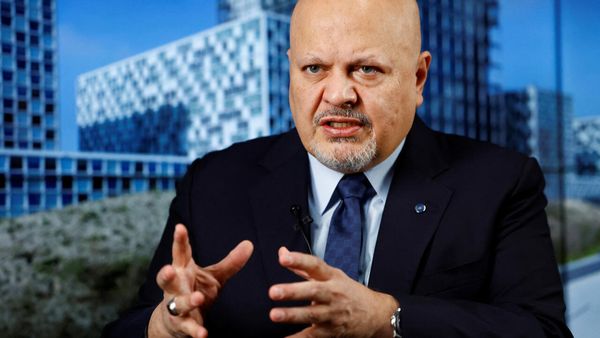
Beneath the 800-bed Galilee medical centre in the northern Israeli city of Nahariya, treatment is being conducted in an underground complex beneath the hospital.
About 7km from the border with Lebanon, a frontier visible from the hospital’s car park and already under threat from Hezbollah’s missiles and explosive drones, the doctors are aware that in the event of an escalating war their facility will be on the frontline.
Beneath exposed pipe work, on bare concrete floors with little in the way of comfort or privacy, a warren of busy wards and surgical units has been established. Boxes of supplies are piled head high in gloomy corridors lit by artificial light.
A suite equipped with monitors and screens will act as the nerve centre in the event of a full-scale war between Israel and Hezbollah, a prospect that looms ever larger amid rising hostilities and exchanges of fire across the border. On the backs of chairs are hi-vis jackets, describing the roles that will be required, including “mass casualty coordinator”.
In charge of the emergency preparations is Dr Tsvi Sheleg, the deputy director of the hospital and an ophthalmologist whose unit was hit by a missile during the 2006 war.
“Two weeks into the conflict,” he says, “we opened a second trauma unit when we realised we might not have enough beds. We have trained for a worst-case scenario that would see continuous missile attacks in concentrated effort to challenge [Israel’s defences]. We have trained for events involving up to 200 casualties occurring every few hours that would see this hospital become a triage centre.”
Not all of the threat is new. Their preparations reflect a crisis that has long been building to this point, he says. “We started preparing for this two-and-a-half years ago. We met with the northern and home front commanders where they described the number of missiles Hezbollah had acquired.”
It is not only hospitals that have been preparing for a potential widening of the conflict. On Wednesday Israel’s religious services minister, Michael Malkieli, in charge of burials in Israel, told the rightwing Channel 14 his office was preparing for “bigger things in the north”, adding “there are some things you don’t say on air”.
The head of Israel’s grid provoked controversy last week by wondering out loud how the country would cope with an attack on its electricity generation – another reflection of how the threat of a wider war on its northern border has been ever more keenly felt in recent weeks.
While low-level conflict on the border has occurred almost daily since 8 October when Hezbollah began firing in support of Hamas in the war in Gaza, the threats have escalated sharply on both sides as the months have worn on.
This week senior Israeli generals announced they had signed off on a plan for an offensive to drive Hezbollah from the border, while the militant group’s leader, Sayyed Hassan Nasrallah, warned of a war “without rules and without ceiling”, threatening it could spread to Cyprus, which has hosted Israeli military exercises.
On Friday those tensions were raised further amid reports that US officials were warning Israel against launching a “blitzkrieg” offensive against Hezbollah, cautioning that its anti-missile defences could be overwhelmed.
The consequences are already being felt. In Israel about 60,000 people have been displaced. Once busy places, such as Kiryat Shmona, close to the border, have become ghost towns.
Falling Hezbollah drones and rockets have set widespread fires across the hilly landscape. And as the war in the north has dragged on and become more perilous, the situation has become more politically toxic for the government of Benjamin Netanyahu, whose attention has been focused most on the fighting with Hamas in Gaza.
Despite frantic diplomatic efforts led by the US to de-escalate the conflict, public opinion is pushing for a military response, with 60% of Israelis calling for an attack on Hezbollah “with full force”, according to a recent poll by the Jewish People Policy Institute.
As the threat of war has grown, it has imposed itself ever deeper into Israel’s heartland. Seen from the road entering Haifa, the port’s huge red and white painted derricks dominate the skyline, competing for attention with the refraction towers of the Bazan group’s refinery.
On Tuesday these locations, so familiar to the city’s residents, were presented in a disturbing new perspective in footage captured by a Hezbollah surveillance drone flying overhead and then broadcast in an explicit threat to the city of 300,000.
In his wine-importing business within sight of the port, Andre Suidan, who has run his business for 30 years, says some of his longtime customers are choosing to leave Israel with their family.
“I had someone come in just yesterday who is leaving. They came in to buy a small present for the people who will be hosting them. It’s a tough decision but it’s normal as you sense the bombing coming closer. You can’t count on some imaginary friend to protect you.”
Suidan says he stayed in Haifa through the last war with Hezbollah. “I thought the best way to cope was to ignore it.” He is less sanguine now. “I doubt I will be able to ignore it this time. I compare it to Hollywood films. It gets more violent all the time. The thing is to get attention. To get attention means to be ruthless.”
Eight months of war, he adds, have brought people to exhaustion. “People can’t cope with any more tension. The stress of war is not about any specific incident. It’s about turning up the heat on a whole nation.”
But it is in sight of the border that the conflict feels most real. While Nahariya – like Haifa – was bustling with life on Friday morning with cafes and streets full of families, beyond the city in countryside overlooked by the hills of the border, the conflict is more obvious.
On the porch of a home in kibbutz Kabri, a group of residents gathered for an outdoor lunch to talk about the situation. There was a distant boom, then smoke rose from where the hills fall into the sea, the site of an army base on the border marked by its antennas.
Black smoke rose from the detonation. A few minutes later the Israel Defense Forces identified it as a Hezbollah suicide drone that had struck nearby and soon the sound of outgoing Israeli artillery was audible.
Three generations of the men sitting at the table fought in Lebanon: in the early 1980s, in 1995 and in the last major war in 2006.
“We have all been in Lebanon,” says Adi Ceynan, the head of the kibbutz. “We know what it looks like on other side. We know one of the choices facing us is [to] be on the other side of the border.”
Goni Harash was waiting to start his guard shift as a first responder, a rifle slung around his shoulder. Life, he says, has changed profoundly in the last eight months. Like many, he left with his family in the immediate aftermath of Hamas’s attack on 7 October and Hezbollah’s entry into the conflict on 8 October. Most people, he says, have returned despite the proximity of the war and the threat of escalation.
“On the one hand people are happy to be here. You can’t hide and people don’t want to hide. But everything is really tense. All day you can hear bombs, sirens and alarms. My kids used to walk to school. Now they don’t walk anywhere on their own.”
While there are some disagreements among this kibbutz community, there is common ground in feeling abandoned by the Israeli government and being left to their fate.
There is polite dispute is over what needs to be done. While some would accept a shorter-term deal, if it brings back peace even for a while, others here believe only a military offensive – and soon – will redress the balance.
“No one knows what’s best,” says Goni. “Is it best to see a major conflict or come to an agreement? It feels like the people who are supposed to know, know least of all. The government needs to give us something.”







